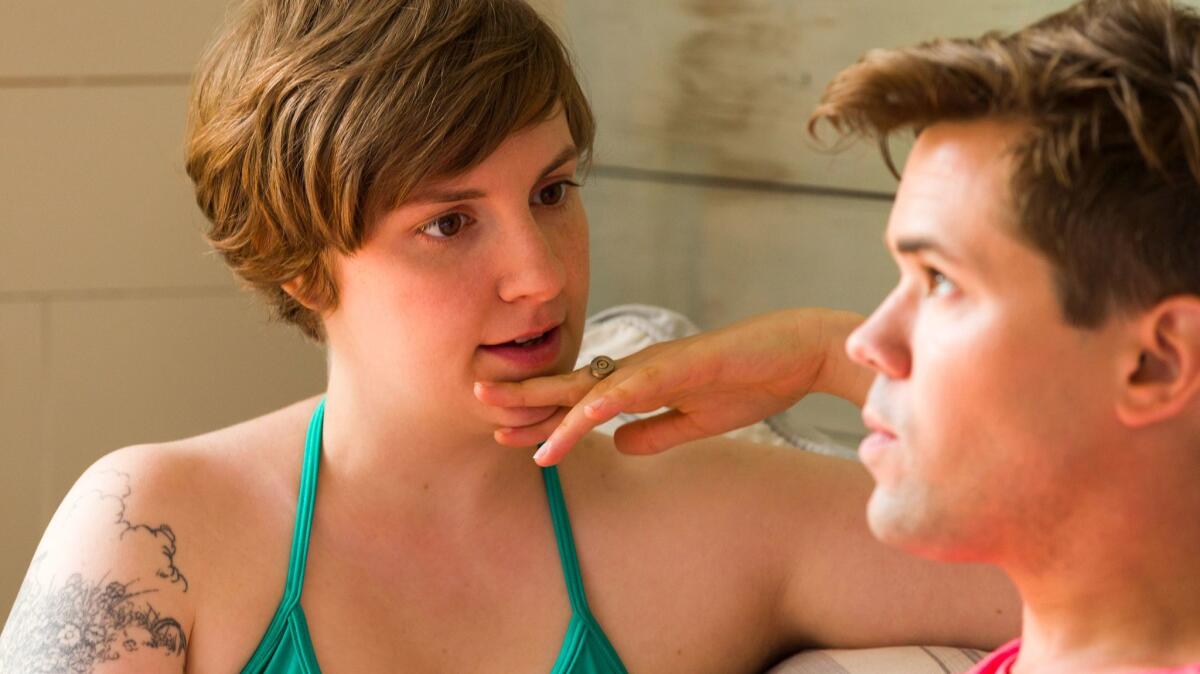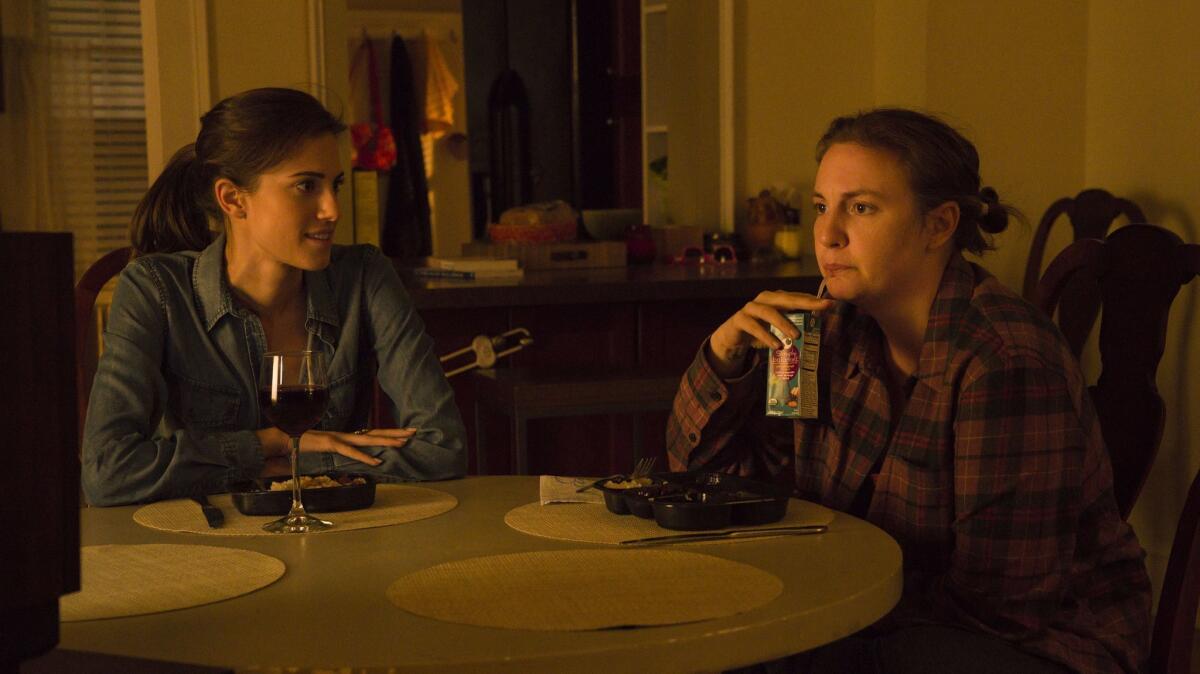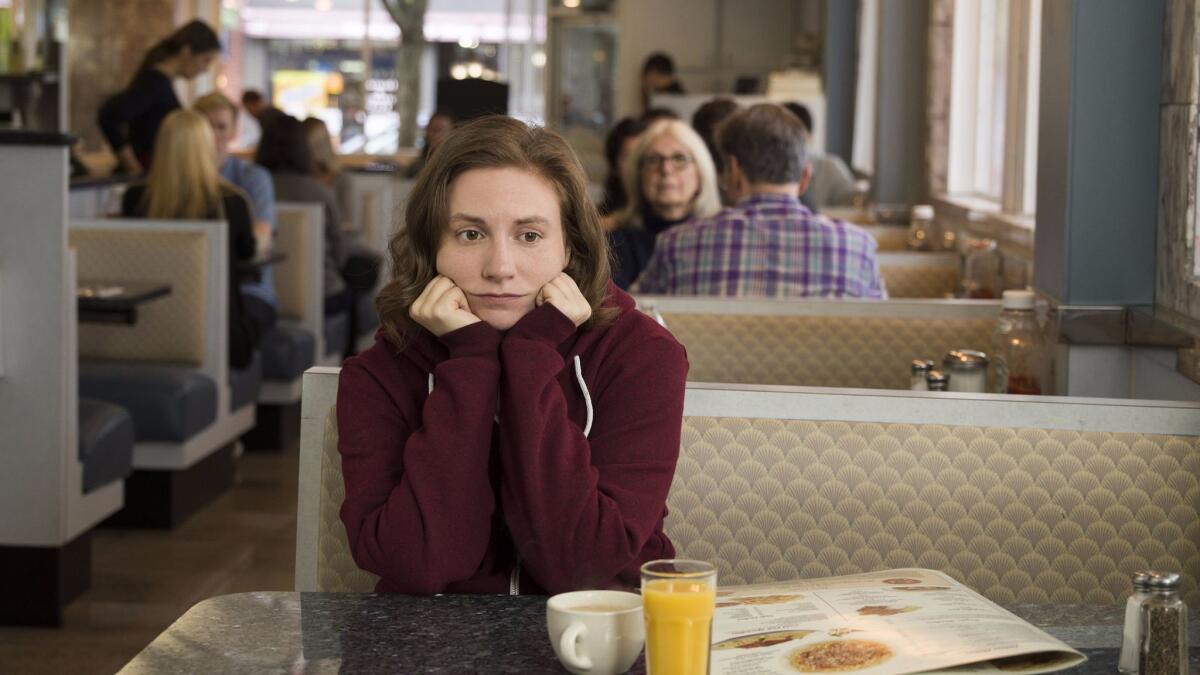Q&A: Lena Dunham and Jenni Konner break down the series finale of ‘Girls’
- Share via
After five years, 62 episodes and 3 zillion overwrought thinkpieces, HBO’s “Girls” came to an end Sunday night. (Spoilers ahead.)
The finale of
A few days before the finale aired, we spoke to Dunham and showrunner Jenni Konner, who co-wrote and directed the finale. Dunham, who spends most of her time in New York, was planning to watch the episode with her parents, Williams, and pizza. Konner, who lives in L.A., was unsure of her plans, but was considering asking executive producer and fellow Angeleno
Many viewers thought the penultimate episode felt like a finale. Was that intentional?
Jenni Konner: Judd came up with the idea that we would do the finale and then a finale. We had too much to say. We had to wrap up the finale of the girls and find out where they wind up and that in fact they’re not all going to be friends, and it’s going to be OK. But we also spent the whole season with Hannah being pregnant, so we’re not going to deprive you of seeing the baby and seeing what she’s like as a mom.
In a way, it felt like Andrew Rannells ’ character Elijah was Hannah’s best friend this season. Did you consider him moving with Hannah instead of Marnie?
Konner: Elijah has been one of her closest friends, but we wanted him to succeed on his own. I think we leave Elijah in a really positive place as evidenced by the fact that everyone wants the Elijah spinoff.
Is that happening?
Konner: I mean, talk to HBO. We’ll do it in a heartbeat. But the thing about Marnie is that it has always been important to her to be the most important [person] in Hannah’s life. It’s a competition. When I was directing her, I was saying to her, “This is like you just won the Olympics. It’s all you’ve been waiting for, for everyone else to drop out and you’re the last man standing.” But then you see the episode and you think, thank God Marnie was there. She took care of the baby when Hannah was flipping out. I don’t think she’s going to stay there forever. But she needed to be there for a while.

Jenni, you directed this episode. Lena, did she offer you practical advice about breastfeeding and other aspects of new motherhood?
Lena Dunham: Both her and Judd were huge for me, because I haven’t had a baby. The only experience I’ve had is all of the crazy stuff I’ve been through with my reproductive organs. I tried to draw a little bit on my experience of losing control of my body and reproductive system, but obviously, that’s a really different experience because it also doesn’t involve the joy and intensity of a newborn. It just involves your vagina hurting a lot.
Lena, did the acting experience make you contemplate your own feelings about motherhood?
Dunham: It’s interesting — I’ve always known I wanted to be a mother. Like, literally there’s pictures of me breastfeeding stuffed animals as a child. It’s always just been about the timing. I definitely felt pretty at home in that pregnant belly. I’m not going to lie.
I was totally anticipating a dramatic labor scene.
Dunham: We purposefully didn’t do it. You have the opportunity to see a lot of women screaming their heads off on television about to give birth. We wanted it to be about the actual aftermath of what it feels like once you’ve given birth and who are you then. No one needs to see more of me screaming and sweating than they’ve already seen.
Hannah was also fully naked for the last time.
Konner: We can’t end the show with Lena with pants. You’ve got to start the way you finish, in some ways.
Dunham: You are not getting away from this without full nudity. We choreographed that pretty carefully. Jenni was like, “This is Hannah now.” And we painted little stretch marks on my sides.
We really wanted the body to tell the story of what she’s been through. I’m wearing prosthetic lactation nipples, which I forgot to take off one night when I got home, which was alarming for everybody involved.
Did your boyfriend [musician Jack Antonoff] freak out?
Dunham: He was not with me that week, but I was sending him pictures. He was a little disoriented by the pregnant belly. It’s weird to see your partner, whose body you know, like that. Not to be a gender essentialist, but for me, putting on the stomach and holding the baby got me into a mindset. And I feel like for dudes, it’s like the child needs to be in their lap for them to process what’s going on. I was like, “Don’t you feel warm looking at me in this belly?” He was like, “You look like you’re wearing a belly.” It sort of tickled and amused him. There’s something very primal about being a woman with a pregnant stomach.

Was the final breastfeeding scene meant to represent the idea that finally, after all these years, Hannah is able to take care of someone other than herself?
Dunham: Completely. It’s definitely not a pro-breastfeeding screed, it’s more about what that represents. That’s a huge, huge, huge emotional moment for her. I think that was part of how she needed to evolve. Everybody was so quick with the show to demand a political statement. People know what our politics are around reproduction. That’s not what we were doing here. One of the extras was like, “I feel worried that this is too prescriptive about breastfeeding.” And we were like, “We don’t have an opinion about whether you should breastfeed or not. This is just about Hannah and her weird journey.”
What about Hannah’s teaching job? There’s been a lot of chatter about how unrealistic it seemed for her to get such a good job offer.
Konner: It is so funny to me that people are so upset about that. I’m like, first of all, anyone can get a job teaching an Internet class for 10 minutes at Bard.
Um, can they?
Konner: I think so. Teaching how to write for the Internet? I do. She’s not on the tenure track. But that’s also a great example of: Who cares? It’s a show.

Even though the show finished filming months ago, there are still plenty of tabloid stories chronicling your weight, Lena. Why do you think people love to talk about your body so much?
Dunham: My body, to me, just feels like this incredibly changeable thing I use as a tool in my work. I don’t have a super ego-driven association with the shape of my body. So when other people seem delighted by my weight loss, often I consider it to be a projection. I look at it and go, “Oh, that’s your projection because what you’re thinking about every day is a desire to change your body.”
Konner: She’s literally the sexiest person she knows. She feels like Rihanna all the time. She also has a slight disconnection to her body in that she’ll shoot a sex scene and then come out to the monitor to watch it almost naked. We’ve all been putting robes on her in between takes because she just wasn’t thinking about it, but it’s distracting to everybody when you’re wearing a tiny bikini and everyone else is in work boots and jeans.
Dunham: It’s funny to say as a person who gets naked on TV a lot “I’m sick of attention about my body,” but it was impossible for people to imagine that my nudity was a creative choice. And of course I was trying to change the way that women were looked at and what we thought was an acceptable body on television. But also, it was supposed to be naturalism, the way that ‘70s film dealt with sex and bodies. It was often about serving the scene with as much honesty and passion I could, it wasn’t always about Lena jamming a “normal” body down people’s throats. I guess my mantra for myself this year has been, in some way, of course my work will always be inherently political. But depoliticizing some of it and reminding some people that it’s art.
Follow me on Twitter @AmyKinLA
ALSO
Forget bathing suit Barbie. We love Lena Dunham in her green bikini.
Why do so many of us love 'Broad City' and hate-love 'Girls'?
The complete guide to home viewing
Get Screen Gab for everything about the TV shows and streaming movies everyone’s talking about.
You may occasionally receive promotional content from the Los Angeles Times.




